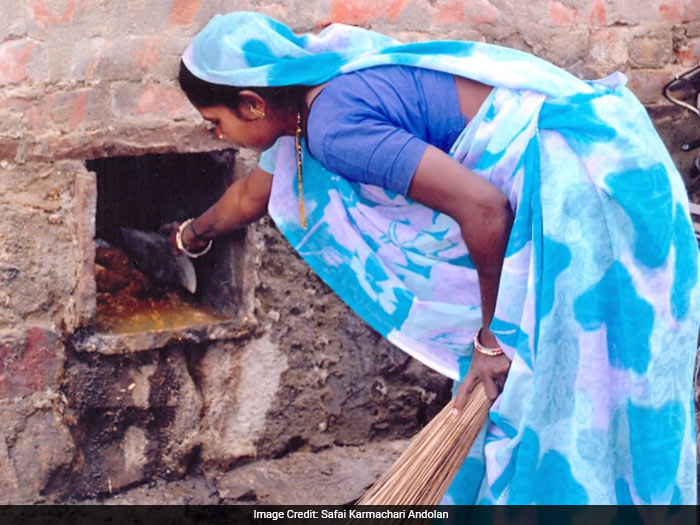Highlights
- Over 700,000 manual scavengers are still active in India
- Maharashtra has 63,000 households dependent on manual scavengers
- Manual scavenging is practiced despite it being illegal
“I remember the first time I had gone inside a septic tank to clean it. The stink was unbearable and I couldn’t get rid of it for days. My father was also a cleaner of toilets and he would drink alcohol before entering a sewer or septic tank to endure the smell. He passed away due to tuberculosis as he worked in unhygienic conditions all his life,” narrates 30-year-old Anil as he gets together his rope bucket to start his arduous day. A resident of Adchini, in New Delhi, Anil comes from a family of manual scavengers who have been engaged in the cleaning of dry latrines, sewers and gutters for generations. Manual Scavenging in India was made illegal in 1993, but the practice continues to be India’s shame to this day. So why does a practice this medieval and inhuman continue to persist even as India races to be counted as a developed, industrial and modern nation?
Manual scavenging is a socio-economic problem, and has continued for decades because of unscientific technology employed in Indian latrines. Pit latrines without a proper water seal require the waste to be manually collected in buckets. Manual scavengers are also employed to clean septic tanks, gutters and sewers and all of these post significant health threats to them. Data from the Ministry of Social Justice and Empowerment puts the number of manual scavengers in India at 7,70,338. Maharashtra remains the largest employer of manual scavengers with 63,000 households employing them. Madhya Pradesh and Uttar Pradesh also employ a large number of manual scavengers.
In 2014, when Prime Minister Narendra Modi launched the Swachh Bharat Abhiyan and called for the nation’s participation in building 2 crore toilets, many manual scavengers like Anil had hoped that better infrastructure and better designed toilets will gradually put an end to their miserable profession. But not much has changed in the last three years as Anil and others like him still receive calls for cleaning septic tanks and sewers. The demand for manual scavengers hasn’t subsided, though employing manual scavengers is a punishable offence.
Anil belongs to the Valmiki caste, members of which have been traditionally employed as manual scavengers. The fact that he earns only Rs 300 a day despite toiling for 12 to 13 hours, wading through human filth and faeces, does not help his cause.
Also Read: Liberating People From Manual Scavenging Is A Top Priority For Government: Amit Shah
The Employment of Manual Scavengers and Construction of Dry Latrines (Prohibition) Act, 1993 prohibits employment of anyone for cleaning dry latrines, septic tanks and sewer lines. Doing so attracts imprisonment for up to a year and fine of Rs 50,000. Many newly built toilets in urban households are spawning more septic tanks and sewers, thereby continuing the practice of employing manual scavengers to clean them.
The Swachh Bharat Mission has not addressed the issue of toilet technology or manual scavenging in the last 3 years. It should have taken into account India’s 9.6 million dry latrines which flush waste in the open on priority, before giving the call to build new toilets. Now in the last three years, a large number of toilets with septic tanks have been built. That only makes the situation of manual scavengers worse as they have more toilets to clean now, said Beswada Wilson, founder and national convener of Safai Karmachari Andolan.
Over 10 million toilets have been built under the Swachh Bharat Abhiyan, across rural and urban India. Though the campaign lays stress on building composting toilets, bio-toilets and leach pits, people often choose to construct toilets with septic tanks. Since there has been no campaign stressing on how septic tanks result in the employment of manual scavengers, the practice is in danger of continuing.
During our toilet building drives, we try to convince people to build compost toilets or dig leach pits. But in urban areas, we have found a trend of building septic tanks as people are often under the misconception that compost toilets are unhygienic. Teams which inspect the building of these toilets try and tell people not to build septic tanks but it doesn’t always work, said Arun Baroka, Joint Secretary Swachh Bharat Mission.
Ironically, the Indian Railways remains one of the biggest employers of manual scavengers, but has pledged to build 1,40,000 bio-toilets by 2019 in all operational coaches. Since the Swachh Bharat Mission began, the demand to end manual scavenging has only grown stronger as many are afraid that it might be too late for manual scavengers to bring forward their voice of reasoning. The existence of over 60,000 manual scavengers in New Delhi, India’s national capital itself shows that the issue of manual scavenging has not been dealt with seriously.
Manual scavenging should be completely eradicated. The laws which prohibit scavenging work should be implemented properly, unlike how it is now. People too should be made aware of our plight. Otherwise we will keep cleaning latrines and sewers and lead a miserable life of stench and untimely death, said Anil.
Also Read: Meet The Real Swachh Warriors – Manual Scavengers






























